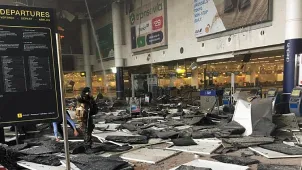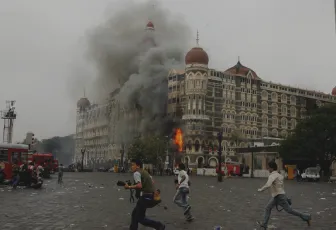International Examples: How SCRs Performed Well/Poorly
Why Look at International Examples?
Security Control Rooms (SCRs) around the world face similar challenges to those in the UK, such as terrorism, cyber threats, workplace violence, and natural disasters. By examining how operators overseas have either succeeded or failed during incidents, we can draw valuable lessons that apply to our own practice. Remember, the Security Industry Authority (SIA) and other bodies like the ACS, BSI, and NSI set the standards here in the UK, but real-world examples give us the practical knowledge to strengthen our operations.
Example of Strong Performance: 2016 Brussels Airport Attacks
When coordinated terrorist attacks struck Brussels Airport, the control room played a vital role. Operators quickly identified CCTV footage of the suspects, relayed information to emergency services, and coordinated building evacuations. Their rapid communication and evidence-handling provided critical intelligence that supported police investigations.

Why It Worked Well:
Operators followed strict procedures for evidence preservation, meaning footage was legally admissible.
Clear communication protocols reduced confusion during evacuation.
Preparedness training allowed operators to stay calm and decisive.
Lesson for UK SCRs: Regular training, compliance with standards like BS 7958 (CCTV Management), and accurate logging can make all the difference in crisis response.
Example of Poor Performance: Mumbai Hotel Attacks (2008)
During the Mumbai terrorist attacks, some hotels’ control rooms struggled to manage the situation. Operators were overwhelmed with calls, some systems failed, and in certain cases, poor communication delayed response times. This led to confusion on the ground and increased casualties.
Why It Went Wrong:
No clear chain of command for information flow.
Over-reliance on untested systems, which failed under pressure.
Inconsistent record-keeping, which hampered later investigations.

Lesson for UK SCRs: Technology is only as strong as the procedures and people behind it. A robust contingency plan, backed by SIA-compliant training, ensures that when systems fail, operators still know exactly what to do.
The Human Factor in Control Rooms
Technology may support SCRs, but people are the real drivers of success. Stress, fatigue, or poor training can weaken even the best systems. Research shows that during a crisis, people can lose up to 40% of their ability to recall details accurately. This is why structured logging, teamwork, and calm communication matter more than memory alone.
Tip: Look after your mental focus on shift. Stay hydrated, take scheduled breaks, and know when to escalate tasks rather than trying to manage everything yourself.
Learning from Debriefs and Post-Incident Reviews
Every international incident, whether well-handled or poorly managed, provides learning opportunities. In the UK, professional bodies encourage security teams to review their actions after major incidents.
Debriefs allow mistakes to be turned into training improvements.
Evidence reviews ensure compliance with standards.
Procedural updates help prevent repeated failures.
Example: After the 7/7 London bombings, inter-agency communication was improved nationwide, so control rooms could share information more effectively.
Real-World Consequences of Failure
When an SCR performs poorly during an incident, the consequences can be severe:
Legal Issues: Evidence may be deemed unusable in court.
Loss of Trust: Both the public and clients lose confidence in security providers.
Operational Risk: Failure to act quickly can increase casualties or damage.
Reputational Damage: Organisations may lose contracts or face fines.
Tips for SCR Operators from International Lessons
Cross-Check Information: Verify reports before escalating, to avoid confusion.
Use Clear Language: No jargon, keep communication short and direct.
Expect System Failures: Always have manual backups such as printed evacuation maps and phone lists.
Stay Calm and Professional: Your composure sets the tone for everyone else.
Record Accurately: Time-stamped logs and clear CCTV handling are vital for investigations.
Scenario for Reflection
You are working in a UK control room during a major public event. Suddenly, the fire alarm triggers, and CCTV shows people pushing towards exits. At the same time, a caller reports seeing smoke in a different part of the building.
How would you prioritise these reports?
Would you trust the alarm, the CCTV, or the caller first?
How would you prevent panic while ensuring an orderly evacuation?
This scenario reflects the need for strong situational awareness and calm decision-making, qualities that distinguish good operators from excellent ones.
Key Considerations for Your Role
Stay Sharp: Spot the Unusual Before It Becomes a Problem
A control room operator is like a radar, always scanning, always alert. The odd bag left behind, the person pacing too much, the sudden change on a monitor… these are the details that make the difference. Staying sharp means spotting the small things that others miss.Be Battle-Ready: Train Like It’s Real
Emergencies don’t come with a warning. The way you practise in drills is exactly how you’ll perform when it counts. Treat every exercise like the real thing, so that when a genuine incident happens, your reactions are automatic and confident.Own It: Your Choices Carry Weight
In the control room, you are the decision-maker. A calm voice on the radio can steady panicked staff, a clear instruction can save minutes, and a mistake with evidence could cost a case in court. Owning your responsibility means recognising that what you do matters, every single time.Keep Growing: Turn Experience into Expertise
Every incident, big or small, is a free lesson. False alarms teach patience, major events teach resilience, and international case studies give perspective. The best operators don’t just clock out at the end of a shift, they take away lessons that make them sharper for the next one.
Did You Know?
Over 90% of criminal trials in the UK involve CCTV evidence, according to the Home Office.
Clear communication during emergencies has been shown to reduce response times by up to 35%, proving the importance of SCR operator professionalism.
Closing Insights: What This Means for You
International incidents highlight one powerful truth: Security Control Rooms are the heartbeat of safety during any crisis. Skilled operators who stay alert, train hard, take responsibility, and keep learning have the power to protect lives and support justice. When these standards are ignored, the consequences are severe and lasting. By following UK compliance standards and drawing on lessons from across the world, you can approach your role with confidence, professionalism, and the certainty that every decision you make truly counts.

